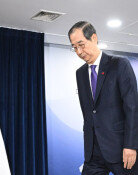Financial authorities prohibit short stock-selling
Financial authorities prohibit short stock-selling
Posted November. 07, 2023 08:02,
Updated November. 07, 2023 08:02
The Financial Services Commission put forward a measure to prohibit short-selling in the stock market until June 25, 2024. As individual investors’ complaints over short-selling grow, short-selling, which had been allowed for 200 stocks in KOSPI and 150 stocks in KOSDAQ since May last year, is prohibited across the board. As a result, the stock market surged on Monday to the point that transactions were temporarily suspended. However, some criticize that this new measure put forward five months before the general elections will reduce foreign investment and delay the advancement of the stock market.
Short-selling is an investment technique of selling stocks whose prices are expected to decline by borrowing them from securities firms and later buying them at lower prices to make profits. As the technique creates profits when stock prices fall and is led by foreign and institutional investors, individual investors pointed it out as the culprit for low stock prices. The suspicion turned out to be true as two foreign-based investment banks in Hong Kong conducted illegal transactions of short-selling without borrowing stocks.
What’s problematic is that it also has some positive impacts. Short-selling plays a role in settling down stock prices that surged without clear performance results to their more appropriate prices. The reason why the Morgan Stanley Capital International Index (MSCI) includes the free allowing of short-selling as a condition to be considered as an advanced country’s stock index is that the index believes short-selling is necessary for foreign investors to make investments with confidence. Based on the same reason, the Financial Services Commission opposed those arguing for prohibiting short-selling by saying that it is a global standard.
As the ruling People Power Party put strong pressure through a closed government-ruling party consultation last weekend, the financial authorities reversed its stance. The ruling party and the financial authorities explained that the current situation needs a ‘general anesthesia operation, rather than a local anesthesia’ as a reason for their decision. However, the party is not hiding its true intention that the measure is part of its strategy for the upcoming general elections as evidenced by a text message from a member of the party, which stated that they were trying to focus on short-selling, following Gimpo, during the National Assembly’s meeting. While illegal short-selling is a crime to be eradicated, there is no stock market in an advanced country that bans a major function of the market due to illegal activities.
South Korea and Turkey are the only countries among the OECD member countries that banned short-selling. While there were legitimate reasons for an international crisis during the 2008 Global Financial Crisis, the 2011 European Debt Crisis, and the 2020 COVID-19 pandemic, there is none now. To prevent the recurrence of a situation that downgrades the South Korean stock market, radical system reform should be made during the next eight months of the short-selling ban so that another surgery is not required.







